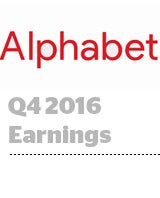Alphabet on Thursday disclosed revenue of more than $26 billion in Q4 2016, a 22% jump over the same period last year and beating industry expectations of $25.2 billion in revenue.
But despite overall revenue growth, the digital ad platform giant’s earnings were undercut by other costs, including a one-time tax charge that pushed its effective tax rate from 16% to 22%, rising traffic acquisition costs (TAC) and new investments in data centers.
Google still represents all but a marginal amount of Alphabet’s revenue. In Q4, Google – which doesn’t break out channels like YouTube, mobile or desktop search – saw revenue grow from $21.2 billion in Q4 2016 to $25.8 billion.
YouTube and mobile remain the engines for Alphabet’s growth, Google CEO Sundar Pichai said during an earnings call with investors. Programmatic ad revenue also “continues to be a strong contributor, reflecting overall advertiser adoption of targeting and programmatic inventory,” he said.
There are headwinds though, many of which have become a constant refrain for Alphabet.
TAC, which Google pays to affiliates to send users to Google or to use Google search as a default, are rising sharply. The company spent $800 million on traffic acquisition in Q4, and the percent of Google ad revenue eaten up by those costs ticked up from 21% to 22%.
Google’s standing in voice-activated search was also a primary concern with investors.
Mark Mahaney, RBC Capital’s managing director who oversees internet investments, said rivals are outselling Google home devices by a wide margin, “which is immaterial now, but in five years what if there’s a new voice search and it isn’t Google in the home?”
Pichai responded that it’s still early days for connected home devices and for the investments necessary to make voice search a major market category. He also pointed to Google’s potential touch points across phones, televisions, cars, desktops and connected devices as a crucial advantage in his vision for Google search AI, compared to competitors that rely on home speaker-type devices for general search (cough, Amazon, cough).
“Someone may ask a question on voice, and then when they pick up their phone later they want continuity,” Pichai said.
AdExchanger Daily
Get our editors’ roundup delivered to your inbox every weekday.
Daily Roundup
Google’s cross-screen access came up again when Pichai was pressed to address YouTube’s recent decision to remove third-party pixels from YouTube and allow search data to inform YouTube buys.
“It’s important to understand users experience YouTube across screens, and I think as part of these changes advertisers will be able to use and get more insights from their campaigns,” Pichai said. “It’s the right direction.”














